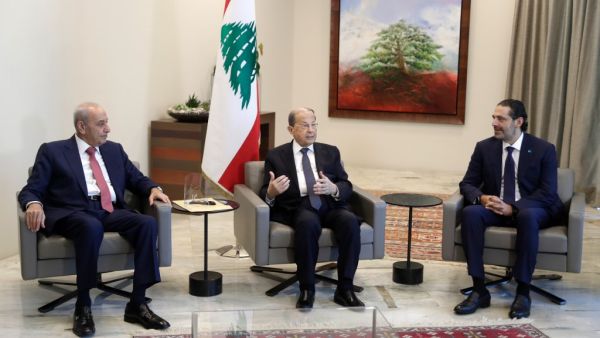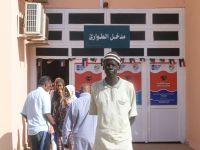The process of forming a Cabinet of specialists to deliver reforms has taken off to a positive start, raising hopes for the birth of the new government headed by Prime Minister-designate Saad Hariri soon, a political source familiar with the process said Sunday.
“The Cabinet formation process has begun in a positive atmosphere, with all the parties promising to abide by the French initiative and facilitate the formation. Lebanon could have a reformist-oriented government within a week if all the parties remained committed to the French initiative and did not obstruct the Cabinet formation with conditions and counterconditions,” the source told The Daily Star.
Hariri met Sunday with President Michel Aoun for the second day in a row, reflecting the premier-designate’s determination to accelerate the government formation.
“Progress was made in the process of forming the new government,” a source at Baabda Palace told The Daily Star, without giving further details.
Hariri struck a somewhat upbeat note about the Cabinet formation efforts after a meeting with Aoun Saturday to brief him on the outcome of his nonbinding consultations with parliamentary blocs the day before.
"[I had] a long session with his excellency the president and the atmosphere is positive," Hariri told reporters in a terse statement after meeting Aoun at Baabda Palace, refusing to give further details.
The political source familiar with the Cabinet formation process pointed out that shortly after his designation for the premiership with a parliamentary majority of 65 MPs Thursday, Hariri has pledged to form a government of nonpartisan specialists to be tasked with implementing economic, financial and administrative reforms outlined in the French initiative designed to lift the crises-ridden country out of its worst economic and financial crunch since the 1975-90 Civil War.
“Hariri has held nonbinding consultations with various parliamentary blocs aimed at sounding out their views on the size, nature and makeup of a government of specialists who are not affiliated with political parties,” the source said. “The atmosphere of these consultations was positive and encouraging.”
Lebanon has been left without a fully functioning government since caretaker Prime Minister Hassan Diab submitted his Cabinet’s resignation on Aug. 10 over the deadly explosion that devastated Beirut Port.
Hariri, backed by France and regional powers, has previously said he was ready to form a new government made up of specialists with a six-month mission to deal with two urgent issues: Halt the economic collapse and rebuild Beirut following the Aug. 4 port blast that also damaged half of the capital, killed nearly 200 people, injured thousands, left 300,000 people homeless and caused losses worth billions of dollars.
While Hariri prefers a small 14-member Cabinet of independent experts in line with the French initiative, Aoun, Parliament Speaker Nabih Berri and Hezbollah are pushing for an expanded Cabinet of 20 or 22 members, arguing that each minister should be assigned only one ministerial portfolio, the source said.
With the issue of Sunni, Shiite and Druze representation in the next government appeared to have been more or less settled, especially with Hariri saying he agreed to assigning the Finance Ministry to the Shiite sect only for one time – a key demand of the two main Shiite groups, the Amal Movement and Hezbollah, Hariri needs to address the problem of Christian representation.
With the Lebanese Forces and the Kataeb Party saying they will not join the new Cabinet, the distribution of key and low-ranking ministerial portfolios allotted to the Christian sect should be divided among the president’s share, the Free Patriotic Movement and the Marada Movement headed by Sleiman Frangieh, a thorny issue that had delayed the Cabinet formation in the past.
After the FPM Strong Lebanon bloc’s meeting with Hariri Friday, Gebran Bassil, going against the French initiative, called for the formation of a techno-political government that would include independent specialists and political figures, and "one unified criterion to prevent obstruction and delays." He was clearly referring to the two Shiite groups’ request to name Shiite members of the new Cabinet.
Hariri has repeatedly promised to implement key reforms outlined in the French initiative that was endorsed by Lebanon’s political leaders in their meeting with French President Emmanuel Macron during his visit to Beirut on Sept. 1.
The initiative aims to put Lebanon on a path of reforms that would eventually lead to unlocking urgent financial aid vital to shoring up the crumbling economy, burdened by a soaring public debt of over $90 billion.
Meanwhile, Maronite Patriarch Bechara Boutros al-Rai Sunday called on Hariri to quickly form a government that can pull Lebanon out of the “state of misery” it has sunk into because of politicians’ corruption and self-interest.
Rai said Lebanese officials had failed in their duty to provide public goods at all levels, whether “legislative, procedural, administrative, judicial, economic, financial, educational” or in health and security.
“Now that the designation consultations have ended and demands are clear ...there must be a speed in the government formation. Don’t let down again the Lebanese and the international community,” Rai said in his Sunday sermon in Bkirki, north of Beirut.
Lebanese politicians, he said, have so far only concerned themselves with “their own personal well-being, disloyalty to the nation, corruption and theft of public finances and the sharing of spoils.” This behavior, he continued, has “dismantled the state and shattered its unity,” while burdening it with debt and plunging it into a “state of misery.”
Rai called on Hariri to “overcome the conditions and counterconditions of the political groups, and avoid the bog of interests, quotas and the appetites of politicians and sectarian partisans.”
He warned Hariri against entering into “secret bilateral agreements” with political parties, saying they carried the seeds of disputes and conflicts.
The patriarch also called on Hariri not to disregard the Christians’ role in the country. “Don’t put the Christians behind your back. Remember what your late father [Rafik Hariri] used to repeat: ‘The country cannot go without the Christians,’” Rai said. He added that the Christians would not compromise over Lebanon because it is their “one and only homeland.”
This article has been adapted from its original source.








